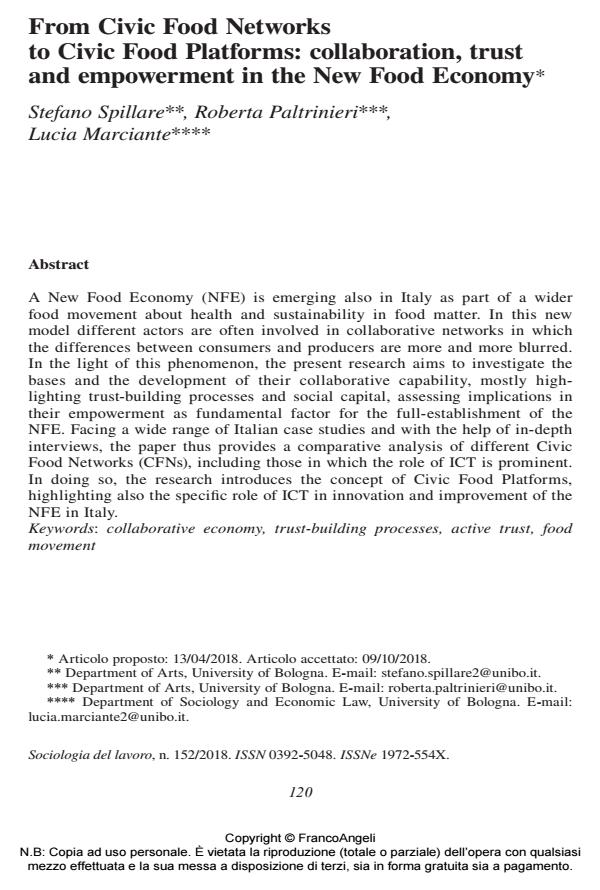From Civic Food Networks to Civic Food Platforms: collaboration, trust and empowerment in the New Food Economy
Titolo Rivista SOCIOLOGIA DEL LAVORO
Autori/Curatori Stefano Spillare, Roberta Paltrinieri, Lucia Marciante
Anno di pubblicazione 2018 Fascicolo 2018/152
Lingua Inglese Numero pagine 17 P. 120-136 Dimensione file 116 KB
DOI 10.3280/SL2018-152007
Il DOI è il codice a barre della proprietà intellettuale: per saperne di più
clicca qui
Qui sotto puoi vedere in anteprima la prima pagina di questo articolo.
Se questo articolo ti interessa, lo puoi acquistare (e scaricare in formato pdf) seguendo le facili indicazioni per acquistare il download credit. Acquista Download Credits per scaricare questo Articolo in formato PDF

FrancoAngeli è membro della Publishers International Linking Association, Inc (PILA), associazione indipendente e non profit per facilitare (attraverso i servizi tecnologici implementati da CrossRef.org) l’accesso degli studiosi ai contenuti digitali nelle pubblicazioni professionali e scientifiche.
A New Food Economy (NFE) is emerging also in Italy as part of a wider food movement about health and sustainability in food matter. In this new model different actors are often involved in collaborative networks in which the differences between consumers and producers are more and more blurred. In the light of this phenomenon, the present research aims to investigate the bases and the development of their collaborative capability, mostly high¬lighting trust-building processes and social capital, assessing implications in their empowerment as fundamental factor for the full-establishment of the NFE. Facing a wide range of Italian case studies and with the help of in-depth interviews, the paper thus provides a comparative analysis of different Civic Food Networks (CFNs), including those in which the role of ICT is prominent. In doing so, the research introduces the concept of Civic Food Platforms, highlighting also the specific role of ICT in innovation and improvement of the NFE in Italy.
Una "New Food Economy" (NFE) si sta sviluppando anche in Italia come parte integrante di un più ampio interesse per le questioni legate alla salute e alla sostenibilità. In questo nuovo modello i diversi soggetti sono spesso coinvolti in network collaborativi nei quali i confini tra produzione e consumo risultano sempre più sfumati. Il presente contributo intende indagare le basi e gli sviluppi di tale capacità collaborativa guardando ai processi di costruzione della fiducia e al capitale sociale, valutandone le implicazioni in termini di empowerment quale presupposto necessario al consolidamento della NFE. Attraverso l’analisi di casi studio e interviste, l’articolo offre una visione comparativa di diversi Civic Food Networks (CFNs), inclusi quelli in cui il ruolo dell’ICT è preminente. L’indagine introduce infatti il concetto di Civic Food Platforms (CFPs), evidenziando così anche lo specifico ruolo dell’ICT nell’innovazione e nella promozione della NFE in Italia.
Parole chiave:Economia collaborativa, processi di costruzione della fiducia, fiducia attiva, food movement
- Networks, Markets & People Stefano Spillare, pp.176 (ISBN:978-3-031-74671-0)
- Enhancing Food Security by Institutionalizing Collaborative Food Alliances in Urban Areas Vibhas Sukhwani, Arie Nurzaman, Nadia Paramitha Kusumawardhani, Anwaar Mohammed AlHinai, Liu Hanyu, Rajib Shaw, in Sustainability /2019 pp.4103
DOI: 10.3390/su11154103
Stefano Spillare, Roberta Paltrinieri, Lucia Marciante, From Civic Food Networks to Civic Food Platforms: collaboration, trust and empowerment in the New Food Economy in "SOCIOLOGIA DEL LAVORO " 152/2018, pp 120-136, DOI: 10.3280/SL2018-152007